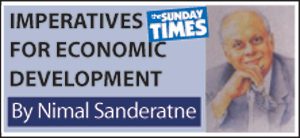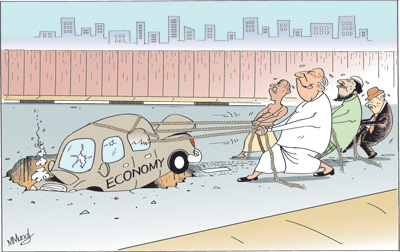Columns
Can the economy recover from setbacks to achieve economic expectations?
View(s):This year’s trade deficit was expected to be much lower than in recent years and the balance of payments was expected to be in a significant surplus. The economy was projected to grow at more than 8 per cent. The prolonged drought in the first half of the year and the mid June communal violence may weaken these expectations. Will developments in the second half of the year overcome these drawbacks to achieve the economic expectations at the beginning of the year?
 The prolonged drought till the middle of the year and the consequent decline in agricultural production and hydroelectricity generation have increased imports of rice and oil and are likely to arrest economic growth. In addition, the setback to tourism owing to communal tensions will impact on economic growth through its backward linkages to other sectors of the economy and affect foreign exchange earnings. These adverse developments would reduce the balance of payments surplus that was expected.
The prolonged drought till the middle of the year and the consequent decline in agricultural production and hydroelectricity generation have increased imports of rice and oil and are likely to arrest economic growth. In addition, the setback to tourism owing to communal tensions will impact on economic growth through its backward linkages to other sectors of the economy and affect foreign exchange earnings. These adverse developments would reduce the balance of payments surplus that was expected.
Drought increases imports
The Maha paddy output is estimated to have declined substantially. Consequently there is a need to import large quantities of rice. The last time when significant rice imports were needed was in 2009 when a similar situation arose. Import expenditure on rice this year would have a significant impact on the trade balance and balance of payments.
Whether the decrease in paddy production could be caught up by the Yala crop is uncertain. Last year paddy production in Yala increased by 57 per cent to 1.77 million metric tonnes, but the stocks of this bumper harvest was for some unknown reason inadequate to meet the shortfall of the Maha 2013/14 crop. If this year’s Yala production could reach last year’s Yala production of 1.77 million metric tonnes, it could reduce further imports before next year’s Maha harvest.
 Oil imports
Oil imports
The low rainfall in the first five months resulted in decreased generation of hydroelectricity from about one half to as low as 13 per cent in the first six months. This necessitated higher expenditure on oil imports. In the first five months of this year oil imports increased by 11 per cent and cost the country nearly US$ 2 billion that was 26 per cent of the import bill and about 45 per cent of the country’s export earnings.
The oil import bill is likely to increase during the rest of the year owing to higher oil prices, repairs to the refinery and damage to the pipeline. The import of refined oil instead of crude at higher prices would also increase oil import expenditure. Trade unions in the industry have also pointed out that the fall in generation is not entirely due to the drought but also due to mismanagement of some plants. Similarly inefficiencies in the Ceylon Petroleum Corporation are said to have resulted in the need to import refined oil. Additional coal power generation later this year is, however, expected to reduce oil dependency.
Tourism
Tourist-earnings that grew by as much as 36 per cent in the first five months of this year and brought in US$ 901 million were expected to contribute substantially to the country’s foreign earnings. However, tourism has had a setback since late June. The extent and duration of this setback is uncertain, but the immediate impact has been the decline in tourists from Middle Eastern countries. Hopefully, there would be a quick restoration of confidence that communal violence will not recur so that tourist-earnings would reach the expected US$ 2.5 billion.
Lower growth
There was much expectation that the economy would grow faster in 2014. The Central Bank projected a growth of above 8 per cent, while international agencies expected growth to be somewhat less but better than that of last year. The higher growth expectation was based primarily on much improved export earnings, higher tourist earnings, increased industrial production and a growth in services. Agriculture was not expected to grow owing to drought conditions. The setback to the economy owing to the drought and communal riots will bring down the growth rate only marginally as the industrial and services sectors are likely to grow and agricultural production could bounce back in the second half of the year.
External finances
There was much expectation that the external finances would improve significantly. Increased exports were expected to reduce the trade deficit, while increased tourist earnings, earnings from services, higher amount of remittances and capital inflows were expected to generate a significant balance of payments surplus that in turn would provide the opportunity of reducing the ballooning external debt. These may not be realised to the same extent as expected at the beginning of this year owing to the unfavourable factors that have emerged.
Although the trade deficit in the first five months has declined by 11 per cent, compared to that of the first five months of last year, with exports increasing by 15.7 per cent and import expenditure decreasing by 1.3 per cent, the trade deficit in the first five months is still high at US$ 3 billion and heading towards a trade deficit of over US$ 7 billion.
Recovery
The expectation of a much reduced trade deficit and a significant balance of payments surplus has diminished owing to larger expenditure on oil imports, large rice imports and possible reduction in tourist earnings. Export growth would have to continue at a higher rate to reduce the trade deficit. It is important to ensure that the favourable developments in exports are not short lived but a part of a medium to long term trend. Overall macroeconomic conditions, a competitive exchange rate and appropriate incentives are needed to ensure continuous growth in exports. One hopes that climatic conditions during the rest of the year would be favourable and that growth of Western economies will ensure increased exports.
It is crucial that the efforts of the Government, civil society, religious leaders and community organisations to restore communal harmony gain momentum to ensure durable social harmony so that not only the setback to tourism could be rectified but also to ensure healthy conditions for overall economic growth.

